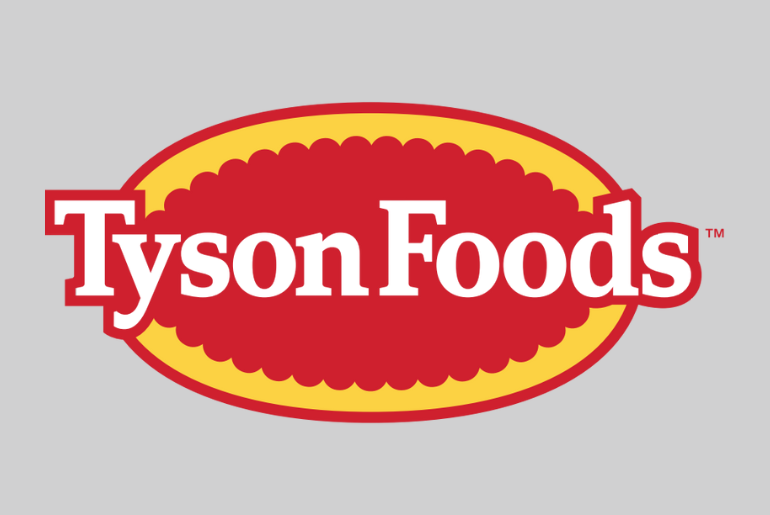The Challenge
Finding quality, affordable childcare for working parents – and especially for shift workers who often have non-traditional hours – can be a huge challenge that impacts both working families and the businesses that employ them. Across Tennessee, more than 80% of parents of young children report employment disruptions due to inadequate childcare, citing affordability, quality and access as major challenges.1
For a manufacturing company like Tyson Foods, a key business obstacle is building a reliable and consistent labor force. While a high retention rate is desirable for any business’s productivity and profitability, that objective is an especially high bar to set in the manufacturing industry, which experiences in excess of 30% turnover every year.2
Tyson’s Solution
In order for Tyson Foods to stabilize its workforce – to entice new talent back to work, and to keep its current employees engaged – the company needed to think outside the box. The mean wage in Tennessee (where Tyson has a major production plant) for manufacturing workers is $35,400 per year.3 Tyson pays its workforce above that rate, but salary alone is not enough to overcome the cost obstacle of childcare.
The Tyson Foods leadership team asked itself what could solve the challenge. More importantly, they asked the same question of their workers, many of whom are parents of young children. The answer: Alleviate the childcare issue its workers were facing and build a single solution that benefited its working families while addressing the company’s retention goals.
“We strive to be the most sought-after place to work in the communities in which we operate,” said Garrett Dolan, senior manager of social responsibility at Tyson Foods. “By listening to our team members, we identified childcare as a need. Tennessee’s average childcare cost is about $9,000 per year. By opening the Tyson Learning Center, we are able to provide accessible, high-quality care and education at a subsidized rate.”
Tyson’s Investment in Child Care
Tyson Foods partnered with KinderCare to build and launch a quality, onsite childcare center, Tyson Learning Center (TLC), which opened for its manufacturing workforce in Humboldt, Tennessee, in July 2023. The center, located directly across the street from Tyson Foods’ local manufacturing facility, is open during non-traditional hours to accommodate its workforce and provides high-quality, early learning curriculum through its KinderCare partnership and learning model. Click here for a virtual tour of the center.
The average cost of tuition at the TLC is $12,200 per year, per child. While Tennessee provides federally funded childcare payment assistance for parents earning up to 85% of the state median income, many Tyson employees are middle income families and need help affording childcare. Therefore, Tyson Foods pays up to $6,500 per year, per child, which is how much it costs for Tyson Foods to find and hire a new manufacturing laborer. The effect is substantial: the average hourly cost for childcare is less than $2 per hour for those enrolled.
Tyson executives also recognize that quality childcare matters
Additionally, Tyson Foods’ executives recognize that the quality of the childcare setting is mostly dependent on knowledgeable, caring teachers trained in child development and can have a profound impact on early learning. To attract and retain qualified teachers, they’ve arranged with KinderCare to pay Tyson’s childcare teachers competitive salaries that are at least on par with the wages of Tyson’s employee-parents.
“Our goal is for the children who graduate from the TLC to be ahead of other children their age when they are ready for kindergarten,” Dolan said.
The result? Tyson Foods is already seeing an immediate ROI in turnover and absenteeism reduction for those using the onsite childcare – “a major retention tool” for Tyson. “Turnover is a challenge for our business,” Dolan said. “In just a few months of the TLC being open, we’re seeing a dramatic difference in people’s ability to stay at work.”
At the same time, Tyson Foods’ commitment to quality of care, including competitive childcare teacher pay, will help give their employee-parents peace of mind and ensure Tennessee’s youngest learners get the strong foundation they need to succeed in school.
Employee Feedback
“I’m a working mom of five, so it was a big deal to have childcare at work. But the curriculum they offer is the greatest benefit. My kids are learning, and having this option for them is even greater than I imagined. They’re always telling me about the new things they are learning, and I just love it.” -Tiffany Butler
“The Tyson Learning Center has made my life a lot easier. I don’t have to make extra stops. I can just get up, get us ready, come to work and drop them off right across the street. It’s very convenient, it’s affordab,e. and it’s safe. I never have to worry about him.” -Amber Chevas
About Tyson Foods
Tyson Foods, Inc. (NYSE: TSN) is one of the world’s largest food companies and a recognized leader in protein. Founded in 1935 by John W. Tyson and grown under four generations of family leadership, the Company has a broad portfolio of products and brands like Tyson®, Jimmy Dean®, Hillshire Farm®, Ball Park®, Wright®, Aidells®, ibp® and State Fair®. Headquartered in Springdale, Arkansas, the Company had approximately 142,000 team members on October 1, 2022. Through its Core Values, Tyson Foods strives to operate with integrity, create value for its shareholders, customers, communities and team members and serve as a steward of the animals, land and environment entrusted to it. Visit www.tysonfoods.com.
Tyson Foods opened its 370,000-square-foot complex in Humboldt, Tennessee, in April 2021. The $425 million project includes a processing plant, feed mill and hatchery. Tyson currently operates five facilities in Tennessee, employing about 5,000 people with an annual payroll of more than $226 million. Tyson estimates its total statewide annual impact for fiscal 2020, including payroll, grain purchases, utilities, property taxes and charitable contributions to be more than $428 million. The payroll and payments to farmers from the new operation is expected to generate an annual economic benefit of $150 million to the state of Tennessee.
References
- 1. Workforce of Today, Workforce of Tomorrow: The Economics of Tennessee’s Child Care Crisis. December 2022. Tennesseans for Quality Early Education (TQEE). https://tqee.org/2022-child-care-study/.
- Korn Ferry Data.
- U.S. Bureau of Labor Statistics May 2022 Data.





